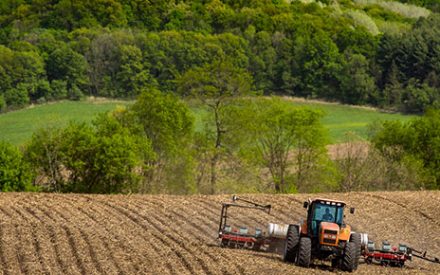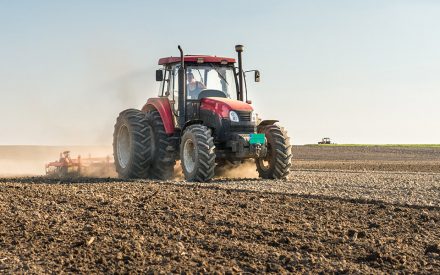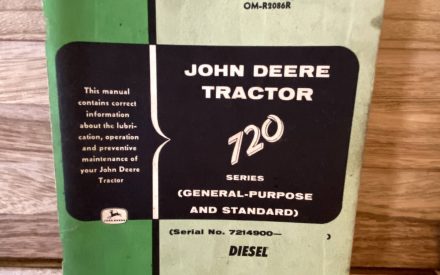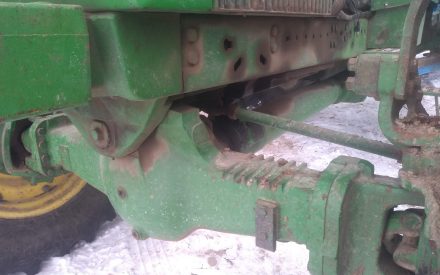Once you’ve decided to buy a piece of farm equipment, your next challenge is sourcing it. Before the internet, there were limited options. One could buy from a local dealer, neighbor, or check the classified ads in the local newspaper. Farms were smaller and there were more farmers engaged in the same enterprises within a close-knit community. Often farmers would sell machinery to each other without ever putting the unit on the roadside with a for sale sign. These days, this scenario occurs less and less – contributing factors include the declining number of farms in an area and the highly specialized nature of farming today. Chances are that you’ll have to search a bit farther afield to find equipment best suited to your operation.
If you are unsure of a make or model that would fill your needs, Tractordata.com is an online guide to almost every make and model tractor ever built, maintained by tractor enthusiasts from around the world. You can search for tractors based upon year made, horsepower and more. The site also gives brief histories of brands as well as their University of Nebraska Tractor Test Laboratory Results if available.
Farmer to Farmer Private Sale
The advantage to buying locally sourced used equipment is that often the purchaser will know the seller and can use that knowledge in the bargaining phase of the purchase. A machine being sold by a farmer with a reputation for meticulous maintenance would be of a higher value than a machine being sold by a farm noted for holding their equipment together with baling wire and duct tape.
Never underestimate the power of networking. If you have an equipment need, a peer may know someone who has something that can satisfy the need. The largest advantage to sourcing equipment in this manner is that using a friendly network can get the buyer a more favorable price.
Local Dealer
Sourcing equipment from a local dealer is still a good idea. Local dealers have a vested interest in farm businesses and the local community. A bad experience by a customer can have a negative effect on a dealer’s business.
A dealer also knows the value of a machine in their local selling area. For example, if you need to purchase a bale wrapper in an area where the majority of farms are making baleage then a bale wrapper sold locally will be worth more there than in an area where farmers are making dry hay or chopping haylage. Conversely, a farm trying to purchase a good used forage wagon in an area with a high concentration of mid-sized dairy farms who still put up their own forage will find prices of good used self-unloading wagons to be higher than in an area where farmers have largely moved away from this practice. In these instances, it may be better for the purchaser to go farther afield to find a better value.
When purchasing from a dealer it is also a good idea to consider the time of year when making the purchase. In general, dealers don’t have a lot of indoor storage space. Fall may be a good time to purchase if the dealership is in an area with high snowfall – that is, if you’re not looking to trade-in a piece of equipment they’ll need to store.
Other times of the year it can be advantageous to have something to trade in. Having an empty lot isn’t a great look for dealers, so most of the time trade-ins offer a win-win. The purchaser can get into a more useful piece of equipment without having to come up with as much cash down. A dealer in turn can sell the traded piece for more than the value given for it in the trade. The downside of this is that dealers know what will and will not sell in their area. They may refuse the trade-in or offer a scrap price. In this case, a farmer may be better off trying to sell the intended trade-in themselves.
Another advantage to buying from a dealer is that they’re in the business to make a sale. A dealer is less likely to see a customer as a time waster and will take the time to answer questions. They’re also accustomed to negotiating and won’t likely take offence to a low-ball offer to start the negotiation process. If a farm has a unit to trade-in, they should not be afraid to negotiate on the price of the machine for purchase and the trade-in value on the machine being replaced. If in the negotiation process an agreement cannot be made, it may be worthwhile to leave a phone number and wait to see if the dealer follows up with a better offer.
One last consideration a buyer must consider when purchasing through a dealer is how much other business they do with that dealer. If the dealer knows the farm to be a good customer through either the parts or service departments, the farm is more likely to be quoted a better price right out of the gate as opposed to a new customer they’ve never dealt with before. Like many aspects of agriculture, relationship building is key to success.
Newspaper Classified Ads
Another old-fashioned way of buying is through the classified ads. Some publications offer free or heavily discounted rates to advertisers who are selling an item below a certain value. For some newspapers, the classified ads are a way to entice more subscriptions so filling the classified section is a priority. To reduce the cost of listing, an advertiser may keep the description brief, or not post a photo of the equipment.
A severe disadvantage to classified ads is that the advertisers are mainly private citizens not used to talking to customers on the phone and wary about answering for numbers that they don’t recognize. When talking to a seller about their classified ad the potential buyer needs to have good discerning skills and have some pointed questions ready to ask in order to get a sense on whether or not this is a piece worth the drive to go look at.
Some questions that get to the heart of the matter may be:
- Are you firm on price?
- Why are you selling?
- How long have you owned it?
If you’ve done your research on the potential weak points of the machine, you could ask the seller if they’ve had any issues in those areas. If they have had issues, inquire how they addressed them.
Onsite Estate/Retirement Auctions

Auctions have long been viewed as an opportunity to purchase machinery for a discounted price. Auctions are also a social event, offering the opportunity to network with other bidders.
The onsite auction gives buyers a chance to look at equipment being sold and talk to others about the piece of equipment. Be aware that another bidder offering negative information about a piece of machinery may be trying to throw off potential competition. Auctioneers will typically have their staff start and demonstrate equipment operating. Unless you are quite knowledgeable about a particular unit, you shouldn’t bid on a tractor or piece of equipment that either won’t start or exhibits any mechanical issues during the demonstration time.
Before attending an auction, do your research about the make and model of the equipment you’re hoping to purchase. Know its reputation, quirks, trade-in value, as well as retail value. Use this information to formulate a price limit. When it comes to bidding, do not let the emotion of the moment get in the way of making a rational decision.
Consignment Sale
Auctions are often held because someone is exiting an enterprise, exiting farming, or a family needs to settle an estate. However, there is another type of auction that auction companies will hold quarterly, monthly, or yearly. These are called consignment sales. Sellers can bring equipment to a consignment sale in the hopes of a quick sale to the highest bidder.
Some nickname these “junk sales” because of their reputation for auctioning items that the previous owners could not sell through other means. This does not mean that quality equipment is never sold through these sales. Sometimes a local dealer will send over items that have simply been on the lot for too long. Some farmers also will choose to sell some of their lower value implements in this manner because it’s more convenient than other methods. The seller will not get as much as they would for the implement on private sale, but they also don’t have to take time out of their busy schedule to show potential buyers the implement.
Consignment sales are a good place to purchase simple tools like tillage equipment, skid steer attachments, cattle equipment, and some 3-point attachments. These tend to be items that are less complex in design and are therefore easier to inspect prior to purchase. One must be careful when purchasing something more complex that can easily hide an internal issue. Equipment that a novice buyer may not want to purchase at a consignment sale would include tractors, combines, skid steers, and road vehicles.

 Used tractors and machinery make work easier on farms and large properties
Used tractors and machinery make work easier on farms and large properties Farm machinery pre-purchase considerations: needs and economics
Farm machinery pre-purchase considerations: needs and economics Consider safety before you purchase a used tractor or farm machine
Consider safety before you purchase a used tractor or farm machine Plan for maintenance to avoid costly repairs with tractor ownership
Plan for maintenance to avoid costly repairs with tractor ownership


